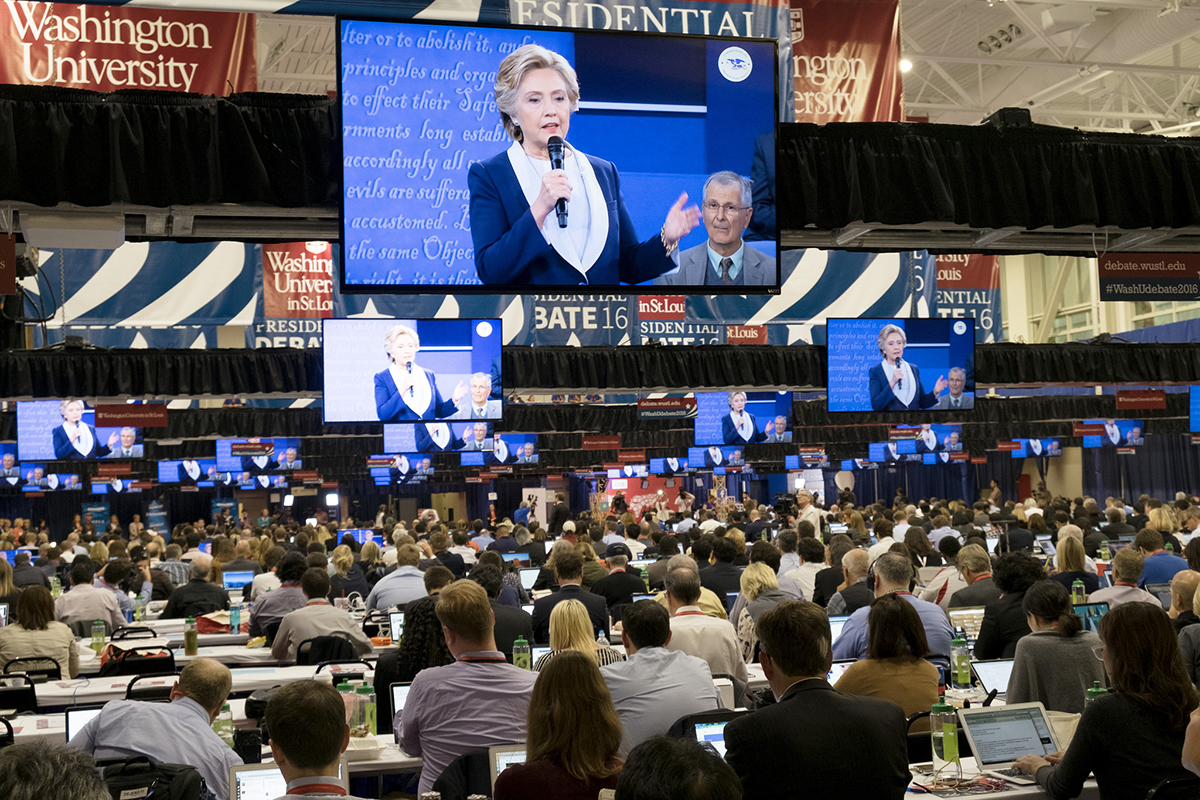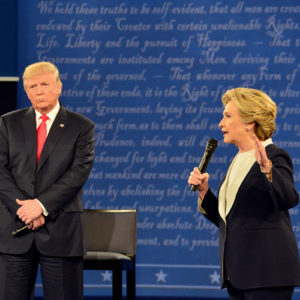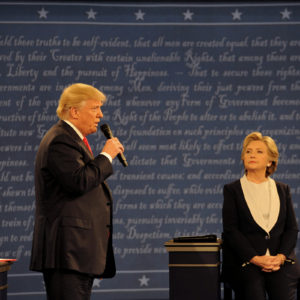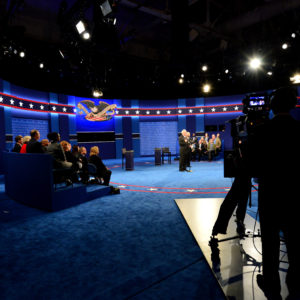Washington University in St. Louis hosted what pundits and politicians alike called one of the most historic presidential debates in history. Democratic nominee Hillary Clinton and Republican nominee Donald Trump faced off for 90 minutes Oct. 9 in the Field House in front of a crowd of 1,000, including Washington University students, politicians and dignitaries.
“This was a moment we have waited for for more than a year, but it was also a moment the nation was waiting for,” said Haley Dolosic, president of the Graduate Professional Council.
The candidates shared the stage with about 40 town hall participants, uncommitted voters from the St. Louis region. The participants asked the candidates about the Affordable Care Act, the status of American Muslims, the tax code and the Supreme Court.
Moderators Anderson Cooper of CNN and Martha Raddatz of ABC also posed questions, culled from social media, about immigration, Syria and recent controversies that have dogged the candidates.
Chancellor Mark S. Wrighton said the debate was the result of more than a year of planning.
“The debates are an important part of our democracy, and I am proud that our students, faculty members and staff came together to make this event a success,” Wrighton said. “The debate demanded a tremendous amount of hard work from every corner of campus, but it is worth it to give our students this experience.
“I am especially proud of the great work done by the team led by Steve Givens, who worked tirelessly to assure a great venue and a great campus experience for all involved. We had great contributions from every member of the team, and the results have been terrific.” (To learn more about these efforts, visit the “ticker” of the university’s debate storytelling site here, and to see more debate-related images, visit our flickr site here.)
Washington University has hosted five debates — four presidential and one vice presidential debate — more than any other university in the nation. In her opening remarks, Janet Brown, executive director of the Commission on Presidential Debates, called the university a partner “without peer.”
Hillary Kroll was one of the 352 students who won a ticket to watch the debate from the Field House bleachers.
“I can’t describe what it was like to witness this historic moment,” said Kroll, a senior from New Jersey studying psychology in Arts & Sciences. “I am energized. Even if you don’t agree with everything that was said on that stage, it was remarkable to be part of the democratic process.”

After the debate, journalists piled into so-called Spin Alley to hear from campaign surrogates such as Sen. Jeff Sessions, of Alabama, and Ben Carson for Trump and Sen. Claire McCaskill and U.S. Rep. Lacy Clay, both of Missouri, for Clinton.
Interest in the debate was already sky-high after the first debate at Hofstra University, which drew a record-setting 84 million viewers. But when a damning recording of Trump surfaced just two days before the debate, all eyes turned to Washington University.
“Washington University has a knack of being in the right place at the right time when it comes to debates,” said Washington University alumna Laura Meckler, who covers the Clinton campaign for The Wall Street Journal. “It hosted what must be the most interesting vice presidential debate in history when Sarah Palin faced off against Joe Biden in 2008. And tonight it hosted a debate after a moment that has rocked that campaign in a way none of us have seen before.”
The debate capped several days of excitement on campus. CNN transformed Brookings Quadrangle stage into a TV news studio, while MSNBC and Fox News set up shop near Graham Chapel. Some 2,000 journalists from around the globe covered the event, and many of them wanted to hear where Washington University students stand on the issues.
Senior Lucy Chin, a Gephardt Institute Civic Scholar, participated in a Facebook Live event on the local Fox affiliate.
“For months, we knew this day was coming, but when the first media truck arrived, it became real,” said Chin, who served as a volunteer at the student ticket distribution center. “I will never forget this happened at my university.”



Comments and respectful dialogue are encouraged, but content will be moderated. Please, no personal attacks, obscenity or profanity, selling of commercial products, or endorsements of political candidates or positions. We reserve the right to remove any inappropriate comments. We also cannot address individual medical concerns or provide medical advice in this forum.